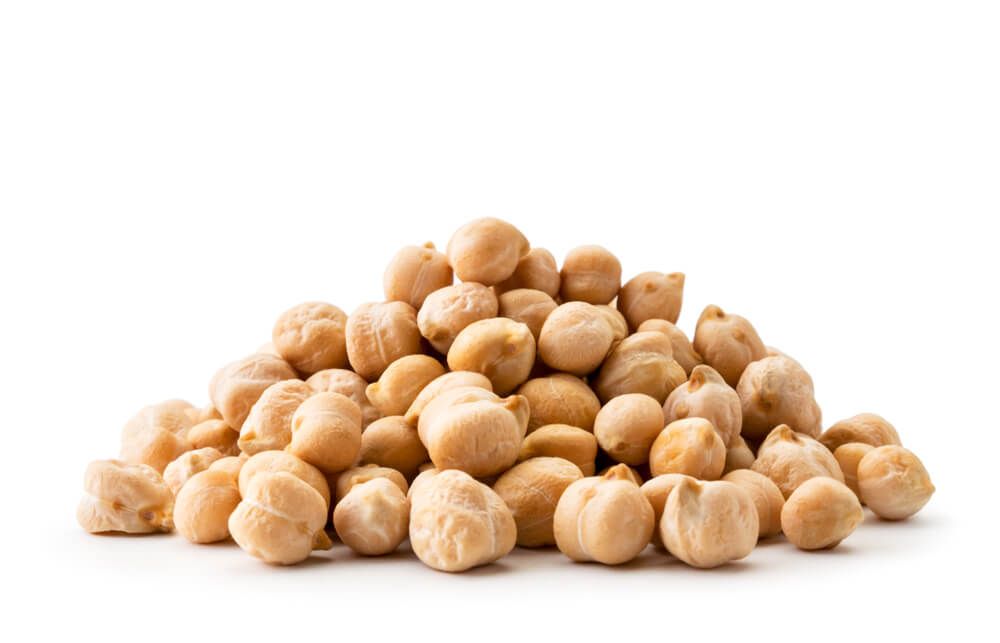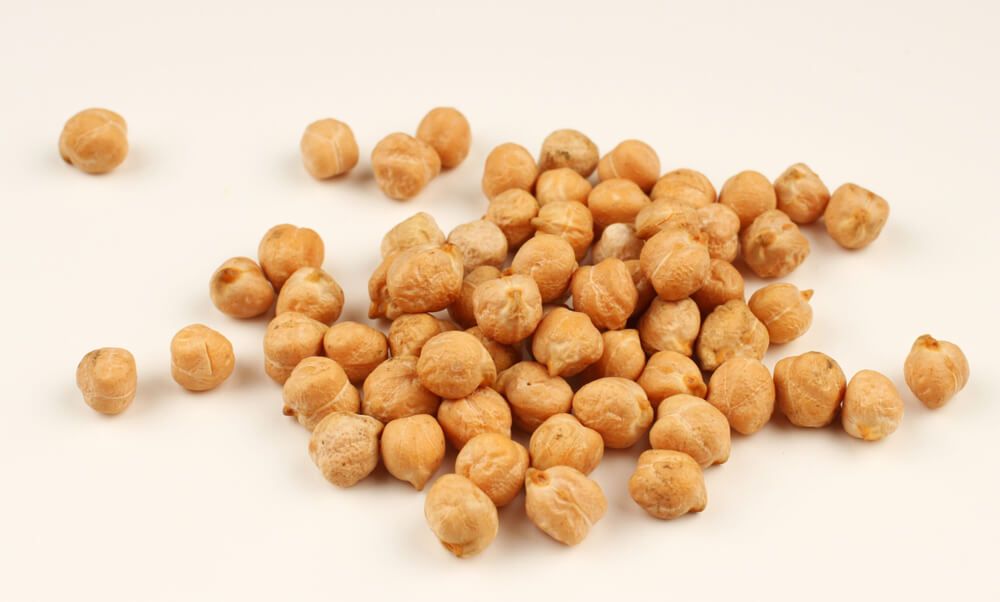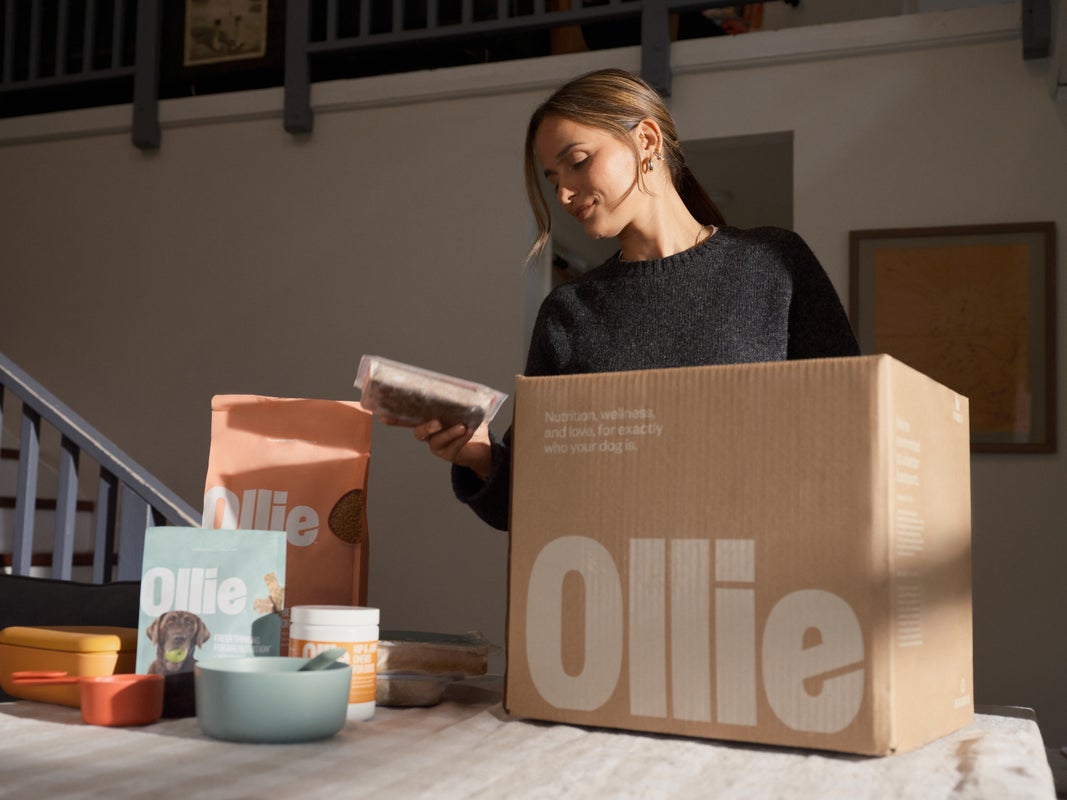Hey Ollie blog readers! We’re offering you an exclusive 60% OFF your starter box! Try now!
Ever caught your pup eyeing your hummus or trying to sneak a bite of your grain bowl? It’s a fair question: Can dogs eat chickpeas? While dips like hummus are off-limits due to ingredients like garlic, lemon juice, and salt, the chickpeas themselves—also known as garbanzo beans—might not be a problem.
In this article, we’ll dig into whether dogs can have chickpeas, how they affect digestion, what types to avoid (like canned or seasoned), and when chickpeas can actually be a healthy part of your pup’s diet.
Can Dogs Have Chickpeas?
Yes, dogs can eat chickpeas—as long as they’re cooked and served plain. Chickpeas (also called garbanzo beans) are a safe, nutritious option for most dogs and can offer a plant-based boost of protein, fiber, and essential nutrients.
Rich in potassium, magnesium, folate, and vitamins A, B6, and C, chickpeas support everything from muscle function to immune health. They’re also naturally low in fat and help dogs feel fuller for longer, which makes them a smart ingredient for pups who need help managing their weight.
You may have noticed chickpeas showing up in more commercial dog foods lately. That’s because they’re affordable, shelf-stable, and nutrient-dense—which makes them a convenient grain-free option for pet food brands.
But it’s important to serve chickpeas properly:
- Cooked and plain only—no canned chickpeas with added salt or seasoning
- No garlic, onions, or spices, which are toxic to dogs
- Mashed or soft chickpeas are easier to digest, especially for small dogs or those new to legumes
While chickpeas can be a healthy part of your dog’s diet, they should be served in moderation—not as a main protein source. Always check with your vet before adding new ingredients, especially if your dog has a sensitive stomach or a history of food allergies.
In recent years, chickpeas have increased in their popularity as an ingredient in commercial dog food. Due to their low cost, high protein and fiber content and ability to help your pup feel full, they can be a great addition to dog food recipes.
Are Chickpeas Good For Dogs?
Yes, chickpeas can be good for dogs—when served in the right way and in the right amount. These small legumes are packed with nutrients that support several aspects of canine health, especially for dogs who tolerate plant-based ingredients well.
Here’s what makes chickpeas a healthy option:
- Protein – While not a substitute for animal protein, chickpeas offer a solid plant-based protein boost that supports muscle development and repair.
- Fiber – Helps promote healthy digestion, regular bowel movements, and may contribute to better weight management.
- Vitamins and minerals – Chickpeas are rich in folate, potassium, magnesium, iron, and vitamins A, B6, and C—all of which support immune function, heart health, and energy metabolism.
- Low in fat and cholesterol – A good option for dogs on weight-conscious or heart-healthy diets.
Chickpeas can also help dogs feel full without adding a lot of calories, which is one reason they’re used in some commercial dog foods and fresh meal recipes.
That said, chickpeas aren’t perfect for every dog. Because they’re a legume, they can cause gas or mild stomach upset in some pups—especially if introduced too quickly or fed in large amounts. Always start slow and observe how your dog responds.
Are Chickpeas Safe For Dogs?
Yes, plain chickpeas are safe for dogs when served in moderation. They’re a good source of plant-based protein, fiber, iron, and folate, all of which support energy, digestion, and overall health.
But there’s a catch: Chickpeas are only safe when they’re cooked and unseasoned. Ingredients commonly found in human recipes, like garlic, onions, lemon juice, or added salt,can be harmful to dogs. That means no hummus, no seasoned cans, and no chickpea stews with extras.
Note: If you’re feeding chickpeas to your pup, keep it simple: cooked, plain, and portion-controlled.
What Type of Chickpea Is Best For Dogs?
Not all chickpeas are created equal when it comes to your dog’s diet. Here’s how to tell which types are okay, and which to skip:
Best Chickpeas for Dogs:
- Cooked, plain chickpeas (boiled or steamed)
- Rinsed canned chickpeas (low-sodium, no seasoning)
- Dehydrated chickpeas used in some high-quality dog foods or treats
Chickpeas to Avoid:
- Hummus (contains garlic, lemon, salt, and oil)
- Chickpeas cooked with onions or spices
- Canned chickpeas with added salt or preservatives
- Chickpea flour in high-fat fried foods (like falafel)
If you want to introduce chickpeas, start with a small spoonful of cooked, mashed chickpeas mixed into your dog’s regular food.
How Much Chickpeas Can Dogs Eat?
Even though chickpeas are safe, they should only be a small part of your dog’s diet. Too many can cause gas, bloating, or digestive upset, especially if your pup isn’t used to high-fiber foods.
Here’s a general guideline:
| Dog Size | Max Chickpeas Per Day |
| Small (under 20 lbs) | 1–2 tablespoons |
| Medium (20–50 lbs) | 2–4 tablespoons |
| Large (50+ lbs) | ¼ to ½ cup |
A few tips:
- Always introduce chickpeas slowly to avoid tummy trouble.
- Watch for signs of gas or loose stool and cut back if needed.
- Avoid feeding chickpeas daily—use them as an occasional topper or treat.
If you’re looking for a more balanced way to give your pup plant-powered nutrients, try a fresh, whole-food diet like Ollie, which includes fiber-rich veggies that are easier on digestion.
What are the benefits of chickpeas?
As a complex carbohydrate, chickpeas release energy more slowly than their simple carbohydrate counterparts. This can help control blood sugar for diabetic pups.
Because of their high protein content, chickpeas can help pups manage their weight. Since they help pups feel full longer, they are a good choice for overweight dogs.
For pups who suffer from constipation chickpeas may offer (some) relief. This is because they are high in fiber which can help get things moving.
Chickpeas can help fight inflammation, which causes diseases including osteoarthritis and cancers as well as inflammatory bowel diseases.
Are there any negative side effects of chickpeas?
Like any other food, you offer your dog, you want to start slowly to ensure your dog tolerates them. Watch for signs of allergies or indigestion. If your pup is allergic to chickpeas you should not offer them.
You may also want to avoid canned chickpeas, as they can have added sodium and preservatives which aren’t great for your pup.
You may have also read the “FDA announced that it had begun investigating reports of canine dilated cardiomyopathy (DCM) in dogs eating certain pet foods, many labeled as “grain-free,” which contained a high proportion of peas, lentils, other legume seeds (pulses), and/or potatoes in various forms (whole, flour, protein, etc.) as main ingredients (listed within the first 10 ingredients in the ingredient list, before vitamins and minerals).”
If this is concerning to you, ensure that your dog’s food is not on the list of brands under investigation. At Ollie , we keep up with the research and our veterinary nutritionist works to ensure our food is safe for your pup. This includes our lamb recipe which contains chickpeas.
Pet Food Reviewer has also reviewed these studies, their position on this is: “at this time, the link between Dilated Cardiomyopathy and legumes like Chickpeas is not clear and not fully substantiated. We do not recommend changing your dog’s diet based solely on limited studies. Instead, we recommend you visit and discuss this, with your vet.”
Based on your dog’s overall health and nutritional needs, your vet can make more specific recommendations about whether or not to include chickpeas in your dog’s diet.

How To Safely Serve Your Dog Chickpeas
You can mash some chickpeas, which will resemble hummus without the garlic, lemon and olive oil in the human version. You can serve this with some cucumbers or carrot sticks for a tasty snack.
You can use chickpea flour (also called garbanzo bean flour) in place of wheat flour in dog treats like these pumpkin and peanut butter biscuits. This can benefit dogs who are allergic to wheat/gluten or stick to a grain-free diet. This three ingredient treat is easy to make and can be stored safely for 1-2 months making it a great choice for busy pup parents who want to spoil their dogs.
Our Lamb Recipe is also a safe and easy way to add chickpeas to your dog’s diet without having to chop, dice, or cook. Simply thaw the food in your refrigerator and follow your specific serving directions to give your pup a tasty meal filled with great ingredients.
Can Dogs Eat Chickpeas Every Day?
Dogs can eat chickpeas regularly—but moderation is key. While chickpeas are nutrient-rich, feeding them every single day in large amounts could cause digestive issues like gas, bloating, or changes in stool.
If you’re feeding chickpeas daily, it’s best to:
- Keep portions small—a spoonful or two mixed into meals is plenty for most dogs.
- Serve them cooked and plain—no salt, oil, or spices.
- Use them as a supplement, not a main food—they’re not a complete source of protein for dogs.
For dogs on a fresh food plan, chickpeas can be a smart add-on, helping to boost fiber and support digestion. Some Ollie recipes, for example, include small amounts of legumes like chickpeas to round out the nutritional profile.
Still, every dog is different. Some do great with legumes, while others may be more sensitive. If you’re thinking about adding chickpeas to your dog’s daily routine, talk with your vet to make sure it fits your pup’s dietary needs.
Can Dogs Eat Canned Chickpeas?
Technically, dogs can eat canned chickpeas—but most of the time, it’s better to skip them. Canned chickpeas often contain added salt, preservatives, or flavorings that aren’t safe for dogs and could cause digestive upset or sodium overload.
If you’re going to feed your dog canned chickpeas, look for these criteria:
- No added salt – Choose “low sodium” or “no salt added” varieties only.
- No seasoning or spices – Garlic, onion, and chili powders are common in flavored chickpeas and are toxic to dogs.
- Rinse thoroughly – Drain and rinse canned chickpeas well to remove excess sodium and any preservatives left in the liquid.
Even with clean, plain canned chickpeas, it’s still best to use them occasionally—not as a daily addition. Whenever possible, cooking dried chickpeas at home is the safest and healthiest option, since you have full control over ingredients and preparation.
Can Dogs Eat Raw Chickpeas?
No, dogs should not eat raw chickpeas. Uncooked chickpeas—whether dried or straight from the pod—are tough to digest and can cause stomach discomfort, gas, or even intestinal blockage, especially in smaller dogs.
Raw chickpeas also contain anti-nutrients like phytic acid and lectins, which can interfere with your dog’s ability to absorb essential minerals like iron and zinc. While these compounds are mostly neutralized during cooking, they remain active in raw legumes.
If your dog eats a raw chickpea or two by accident, it’s unlikely to cause serious harm—but it may lead to some tummy troubles. To be safe, always cook chickpeas fully and avoid serving them undercooked or raw.
Frequently Asked Questions About Chickpeas and Dogs
Can dogs eat canned chickpeas?
Yes, dogs can eat canned chickpeas, but only if they’re low-sodium and rinsed thoroughly to remove added salt and preservatives. Look for plain canned chickpeas with no spices, onions, or garlic. Always avoid seasoned or flavored varieties.
Are chickpeas good for dogs with food allergies?
They can be. Chickpeas are often used in hypoallergenic or limited-ingredient diets because they’re a plant-based protein that’s less likely to trigger allergic reactions. However, always check with your vet before introducing new foods, especially if your dog has known sensitivities.
How should I prepare chickpeas for my dog?
The best way to prepare chickpeas for your dog is to boil or steam them until soft, then mash or mix them into their food. Avoid adding any salt, oil, or spices. You can also puree them for easier digestion or serve them as part of a balanced, home-cooked meal approved by your vet.
Are chickpeas hard for dogs to digest?
Chickpeas are high in fiber, which is great in small amounts—but too much can lead to gas, bloating, or diarrhea. If your dog has a sensitive stomach, start with a small portion and monitor for any signs of digestive upset.
Can chickpeas cause gas or stomach upset in dogs?
Yes, especially if your dog eats too many or isn’t used to legumes. Chickpeas contain complex carbohydrates and fiber, which can cause gassiness or loose stools if overfed. Start slow, offer small amounts, and always serve them plain.
The Ollie blog is devoted to helping pet parents lead healthier lives with their pups. If you want to learn more about our fresh, human-grade food, check out MyOllie.com.
Tagged As:

The nutrition your dog needs,
the food they want.

Enjoying our articles? Subscribe our Newsletters and get new articles directly to your inbox
You might also like
26 August 2025
4 MINS READ
Can I Make Fresh Dog Food Myself Instead?
If you’re thinking about switching your dog to a fresh food diet, you might be wondering: “Should I buy fresh dog food or make it at home?” It’s a fair question. Many pet parents like the …
by Ollie Pets
26 August 2025
4 MINS READ
Is Fresh Dog Food Safe?
If you’re thinking about switching your dog to a fresh food diet, you might be asking yourself: “Is fresh dog food safe?” It’s a smart question—because feeding fresh means you’re worki…
by Ollie Pets
26 August 2025
4 MINS READ
How Do I Know How Much Fresh Dog Food To Feed?
If you’ve switched your pup to fresh food, you’re probably wondering: “How much fresh dog food should I feed?” It’s not as simple as scooping kibble from a bag—fresh food is more nutri…
by Ollie Pets







